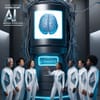A groundbreaking development in artificial intelligence is poised to transform industries and reshape the way we interact with technology. While AI has already made impressive strides in recent years, a new breakthrough promises to accelerate its capabilities in ways that could change the world as we know it. Experts are calling this advancement a "game changer," with the potential to revolutionize everything from healthcare to entertainment to business operations.
At the heart of this AI leap is an innovation that allows machines to understand and generate information with a level of nuance and creativity previously thought to be the exclusive domain of humans. This new breakthrough is powered by advanced machine learning algorithms that can analyze data faster and more accurately, and then apply that knowledge to solve complex problems in real time. What makes this so exciting is that the AI systems can now work autonomously, without needing constant human oversight, in a way that mimics human thought processes.
The possibilities for this technology are vast. In healthcare, for instance, AI could assist doctors in diagnosing diseases with incredible accuracy, even identifying rare conditions that may go unnoticed by human practitioners. In industries like finance and marketing, AI could optimize decision-making, predict trends, and personalize experiences for customers in ways that were never before possible. Even fields like creative arts and content generation could benefit, with AI capable of producing music, writing, and visual art that rivals human creations.
This development also opens the door to even more sophisticated AI systems that could work across multiple domains simultaneously. Imagine an AI that can assist with everything from project management to customer support to research and development—all without missing a beat. For businesses, this could mean a major shift in how operations are run, with AI handling repetitive tasks and freeing up human workers to focus on more strategic, high-level work.
However, with such transformative potential comes a range of important questions. As AI becomes more capable, it also raises concerns about job displacement, data privacy, and ethical considerations. If AI systems begin making decisions that impact people's lives—whether in hiring, healthcare, or financial services—who is responsible for ensuring these decisions are fair, transparent, and unbiased? Moreover, as these systems become more autonomous, how do we ensure that their behavior aligns with human values and doesn’t lead to unintended consequences?
Experts are calling for careful planning and regulation to guide the development and deployment of this new AI technology. While the possibilities are endless, it’s crucial to balance innovation with responsibility. This will require collaboration between technologists, policymakers, and other stakeholders to ensure that AI evolves in a way that benefits society as a whole.
The next few years are likely to see rapid progress as this AI breakthrough becomes more widely implemented across various sectors. Whether it’s improving healthcare outcomes, revolutionizing business operations, or creating entirely new industries, the impact of this technology will be profound. But as we venture into this new era, it’s important to keep in mind the broader implications and ensure that the benefits of AI are shared equitably.


